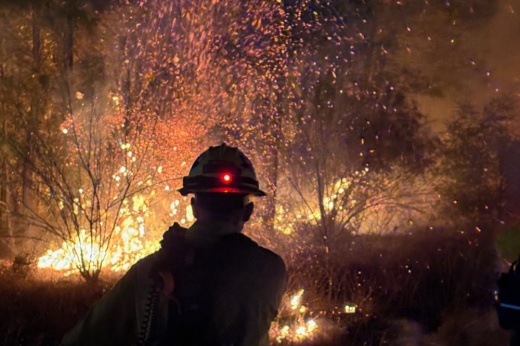A state senator representing the Panhandle has now introduced legislation aimed at improving how communities prepare for and respond to fires and other natural disasters. Senate Bill 34 would create a statewide database of firefighting equipment, increase funding for volunteer fire departments and streamline communication among first responders.
“Wildfires in Texas have grown in both intensity and frequency over the past two decades, with longer fire seasons and more severe events,” bill author Sen. Kevin Sparks, R-Midland, said during a March 31 hearing. “SB 34... ensures that Texas is better equipped to protect communities, wildlife and our economy from future wildfire devastation.”
Sparks’ bill was left pending in the Texas Senate Water, Agriculture and Rural Affairs Committee on March 31. If the committee approves SB 34 during a future hearing, it will head to the Senate floor.
At a glance
Sparks said issues with equipment and communication slowed volunteer firefighters’ “heroic efforts” in response to the Panhandle wildfires.
He attributed this in part to the “underfunding” of a grant program that helps fund volunteer fire departments in rural areas of the state. SB 34 would expand that program from $30 million to $40 million annually. Sparks said requests often exceed $43 million per year.
The program helps volunteer fire departments pay for vehicles, rescue equipment, protective gear, computer systems and training for firefighters, according to the Texas A&M Forest Service.
Under SB 34, the forest service would create a database of all firefighting equipment in the state, which advocates said would allow fire departments to better access equipment in emergencies. The database would be updated at least annually and include equipment descriptions and contact information for participating departments.
The Senate passed a separate Sparks bill that would create the database March 11.
More details
SB 34 would also create the Texas Interoperability Council, tasked with developing a statewide plan to improve communication among first responders from various agencies.
“With any disaster, lessons are learned about how to respond and improve. One of those lessons is the fact that we need much better communication between state and local agencies and governments,” said Carl Ray Polk, Jr., president of the Texas and Southwestern Cattle Raisers Association, during the March 31 hearing. “We can greatly improve our response to wildfires and other disasters by simply communicating better.”
During a March 12 House hearing, Nim Kidd, chief of the Texas Division of Emergency Management, called the proposed council “the boldest move I have seen in my career.”
Kidd began his career 33 years ago as a volunteer firefighter in La Vernia, a city east of San Antonio. He said volunteer firefighters sometimes pay for their own training and equipment, and across the state, first responders from different agencies do not have the technology to communicate with one another remotely.
“This council will set up an organizational structure to bring the over 50 independent operators of radio systems today to the same place... so that we can standardize our communication, standardize our training and improve our capability to respond to all disasters,” Kidd told the House State Affairs Committee on March 12.
SB 34 would also require the state Public Utility Commission and the Texas Railroad Commission—which oversees the oil and gas industry—to work together to regulate faulty power lines at well sites or other oil and gas facilities. If the issue was not resolved after an inspection, the two agencies could require that the power line be disconnected, according to the bill.
The House investigative committee found the Panhandle wildfires were caused by downed power poles and related issues.
Put in perspective
As of March 31, 143 of Texas’ 254 counties had active burn bans, according to the forest service, and a majority of the state was under moderate or higher fire danger.
A 2024 report from the state climatologist found Texas’ wildfire season will get longer, due to rising temperatures and varying rainfall. The report also found that larger portions of the state will be susceptible to wildfires.
“While these changes [proposed in SB 34] are important for state wildfire response, we also see them as essential to other extreme weather events that Texas will face, including floods, hurricanes and other severe storms,” Jeremy Mazur, a policy director for the nonpartisan think tank Texas 2036, said March 31.





